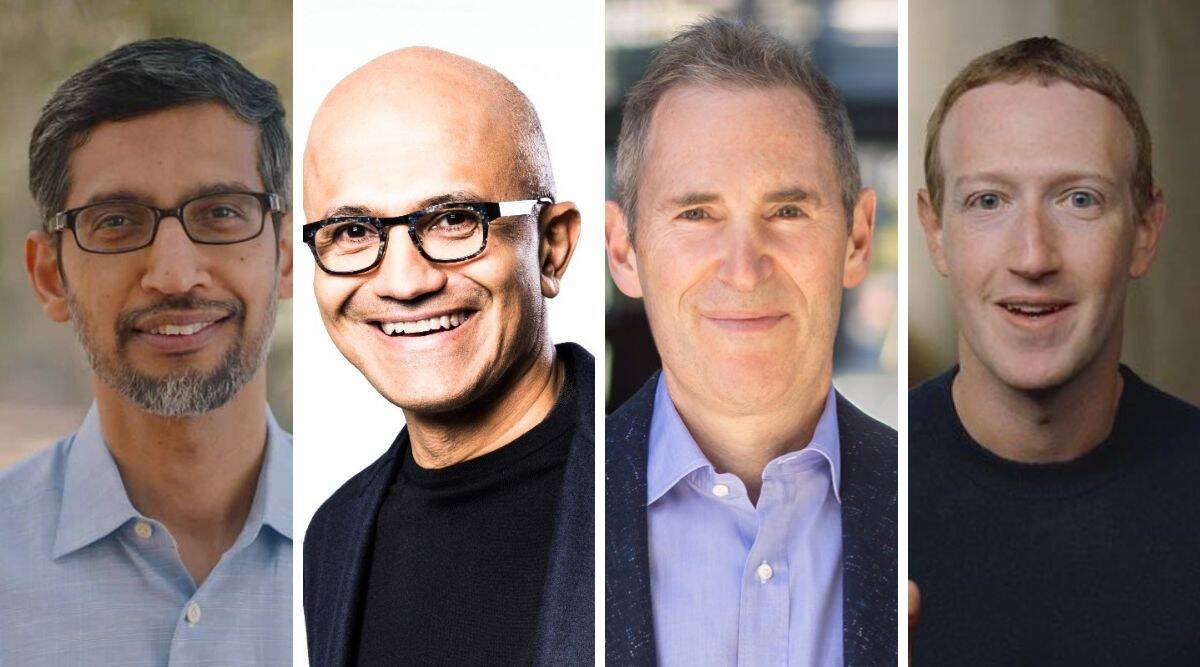From Sundar Pichai to Satya Nadella: How big tech CEOs justified layoffs

[ad_1]
Google parent Alphabet announced on Friday that it would cut about 12,000 jobs, nearly six per cent of its workforce. With this move, Google joins the long list of other tech giants that have laid off workers while drastically scaling back their operations. From Sundar Pichai of Google to Satya Nadella of Microsoft, here is how big tech firms’ CEOs justified the sacking.
“Different economic reality”: Sunder Pichai, Google
In a blog post announcing the layoffs, Google CEO Sundar Pichai said that he takes “full responsibility” for the decisions that led to it. Pichai added that it is only inevitable that Google would undergo some difficult economic cycles, being an almost 25-year-old company. According to Pichai, the company witnessed “dramatic growth” in the last two years and hired many employees for a “different economic reality” than the company faces today.
Bloomberg reported that Google’s reduction in headcount follows investor pressure to adopt a more aggressive strategy to curb spending. Ahead of the layoffs, the company had already made a series of cost-cutting moves, including the cancellation of its next-generation Pixelbook laptop and shutting down its game streaming service Stadia.
But it was not all doom and gloom as Pichai went on to speak about reasons why the company’s future outlook could be rosy.
“Pivoting the company to be AI-first years ago led to groundbreaking advances across our businesses and the whole industry. We have a substantial opportunity in front of us with AI across our products and are prepared to approach it boldly and responsibly,” Picha wrote in the blog.
Pichai also spoke about how the company will take some actions to ease the transition for workers, including how it will disburse full pay during the notice period, offer a severance package, pay remaining vacation time, and offer healthcare, job placement services, and immigration support for those affected.
“Invent and Simplify”: Andy Jassy, Amazon
Months after news reports indicated that e-commerce giant Amazon would lay off 10,000 workers, CEO Andy Jassy in January confirmed that the company would be laying off a much larger number of workers—18,000 of them. Unlike Pichai’s, Jassy’s statement was neither remorseful nor apologetic.
Jassy partially attributes the layoffs to Amazon’s “Invent and Simplify” leadership principle. “We sometimes overlook the importance of the critical invention, problem-solving, and simplification that go into figuring out what matters most to customers (and the business), adjusting where we spend our resources and time, and finding a way to do more for customers at a lower cost (passing on savings to customers in the process). Both of these types of Invent and Simplify really matter,” wrote Jassy.
The layoffs at Amazon are happening for the same reason as the one at Google—the company hired new workers expecting a different economic reality than the one that materialised. But, instead of framing it as a mistake, Jassy normalised it as an inevitable part of a company’s lifecycle.
“Larger cultural shift in operation”: Mark Zuckerberg, Meta
Meta announced in November last year that it would be letting go of 11,000 employees, which makes up about 13 per cent of its workforce. Similar to Pichai, Meta CEO Mark Zuckerberg said in a company blog post that he “took accountability” for the decisions that lead to the layoff.
“At the start of Covid, the world rapidly moved online and the surge of e-commerce led to outsized revenue growth. Many people predicted this would be a permanent acceleration that would continue even after the pandemic ended. I did too, so I made the decision to significantly increase our investments. Unfortunately, this did not play out the way I expected,” wrote Zuckerberg, speaking about how the company hired rapidly, predicting that the Covid-induced revenue growth trend will continue.
“Not only has online commerce returned to prior trends, but the macroeconomic downturn, increased competition, and ads signal loss have caused our revenue to be much lower than I’d expected. I got this wrong, and I take responsibility for that,” added Zuckerberg, explaining the reasoning behind the layoffs.
According to Zuckerberg, the layoffs were a last resort for the company and are part of a larger cultural shift in the operation of the company. The company will also continue its hiring freeze while also doing a thorough review of its infrastructure spending. Like Google, Meta will also focus on building its AI infrastructure.
Zuckerberg also spoke about the company’s measures to help affected workers, including severance pay, continued health insurance, career services, and immigration support.
“Exercise caution”: Satya Nadella, Microsoft
Microsoft confirmed earlier this month that it will be laying off nearly 10,000 jobs or about 5 per cent of its workforce. In a company blog post, Satya Nadella said that the company will also make changes to its hardware portfolio while also consolidating office space leases to increase workspace density.
“As we saw customers accelerate their digital spend during the pandemic, we’re now seeing them optimize their digital spend to do more with less. We’re also seeing organizations in every industry and geography exercise caution as some parts of the world are in a recession and other parts are anticipating one. At the same time, the next major wave of computing is being born with advances in AI, as we’re turning the world’s most advanced models into a new computing platform,” wrote Nadella in the blog post.
While Nadella also spoke about further investing in new strategies for the company’s future, he did not specify what those areas will be. But it is evident that AI is one of those areas that the company will be investing in as Semafor had earlier reported that the company is in talks to invest $10 billion in OpenAI, which owns ChatGPT.
Nadella also spoke about the measures that Meta will take to ease the transition for affected workers, including severance pay, continuing health insurance coverage, career transition services and a 60-day notice period.
[ad_2]
Source link






